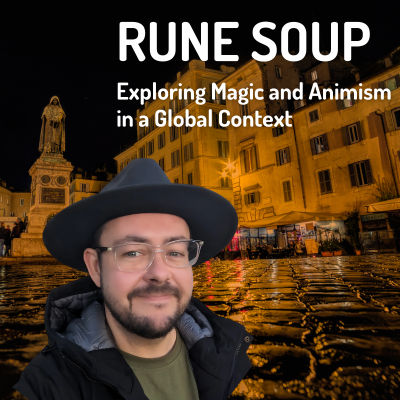
Rune Soup
inglés
Historia y religión
Empieza 7 días de prueba
$99 / mes después de la prueba.Cancela cuando quieras.
- 20 horas de audiolibros al mes
- Podcasts solo en Podimo
- Podcast gratuitos
Acerca de Rune Soup
Rune Soup is a podcast channel that platforms the most important discussions at the cutting edge of magic, animism and spirit work. Gordon is chaos magician, shamanic practitioner, podcaster, author and permaculture designer with a background in data and analytics gained at some of the world's largest media companies. He is the author of four books on magic, animism and star lore: Star.Ships: A Prehistory of the Spirits, The Chaos Protocols, Pieces of Eight and Ani.Mystic: Encounters With A Living Cosmos. When not travelling, Gordon hosts his weekly show, Rune Soup, from a small permaculture farm in southern Tasmania.
Todos los episodios
382 episodiosLucifer: Praxis | Peter Grey
Lucifer: Praxis! Peter Grey joins the show once again to talk about his explosive new book. We explore who the being of Lucifer is, his relationship to western magic, western magicians' relationships to him and how the current of liberty, individualism and legitimate rebellion have shaped centuries of culture. An excellent discussion about a milestone achievement in western occulture. Get the damned book here [https://scarletimprint.com/publications/p/lucifer-praxis]. Enjoy!
Discovering the Sacred Through The X-Files | Christopher Knowles
Synchromystic raconteur, author, and pattern seeker Christopher Knowles returns to the show, as well as the wheelhouse, for this one. Not that we would ever need one, but the flimsy excuse for Chris coming back this time is so that we can discuss his amazing new book, XF-ULTRA: The X-Files, Conspiracy Culture, and the National Security State. * Can a 90s genre TV-show both explore AND generate high strangeness * What happened to our ancient mythology? * Who is called to tend the flame of our culture's sacred stories through the chaos all around us? Even if, almost ESPECIALLY if, you've never seen The X-Files before, this journey down to the underworld and back up through the trash stratum of popular culture has wider metaphysical implications that make it essential listening. Show Notes * The Secret Sun on Substack [https://thesecretsun.substack.com/]. * Get XF-ULTRA: The X-Files, Conspiracy Culture, and the National Security State [https://www.amazon.com/XF-ULTRA-DEEPEST-Conspiracy-National-Security/dp/B0FRZ3555J/].
Travelling Ghosts Bent Spoons and the Science of Magic | Dean Radin
In this episode, Dr Radin returns to the show to talk to us about his amazing new book, The Science of Magic. We look at * Meta-analyses with trillion-to-one odds. * Hotel poltergeists that target specific researchers. * Spoons that bend without force. * Sigils. Always, always sigils. Radin explains why materialist skeptics have run out of arguments, how belief literally structures the universe, and why your unconscious mind might be doing magic right now. If you liked Real Magic, this one takes the conversation even further. The dominant of wider inclusions has surely arrived. Show Notes * Pre-order the new book [https://www.amazon.com/dp/0593797574/] * Dr Radin's website [https://www.deanradin.com/]
Otto Rahn, Nazi Grail Hunter | Richard Stanley
Filmmaker Richard Stanley joins us to unpack his incredible book "Otto Rahn: Grail Hunter" - the true story of a gay Jewish medievalist who became the SS's chief grail hunter in Nazi Germany. We explore Stanley's own supernatural experiences on Montségur (getting trapped by lightning), the brutal genocide of the Cathars, and why this whole story feels disturbingly relevant right now. From Lucifer's emerald diadem to disappearing treasures to Stanley's decades-long quest through the most mysterious corners of southern France. Good times! Show Notes * Get the book here [https://www.amazon.com/Otto-Rahn-Grail-Hunter-Cathars/dp/B0DH3N7KV3/]. * Previous documentary trailer mentioned in the episode [https://www.youtube.com/watch?v=nt6yu37aLIw].
How Spirit Entities Shape Human Affairs | Vanese McNeill
Vanese McNeill, co-producer of the Magical Egypt series, returns to the show. In this episode, we explore the hows and possible whys of spirit involvement in history, from the super-elite level down to the everyday. And also across to some of the sillier claims about AI floating in the air like so many plasma entities. And all of this was inspired by a post Vanese wrote on the Magical Egypt substack about ontozoology back in June [https://magicalegypt.substack.com/p/ontozoology]. So that's where we begin, and this is where we go after: 1. The Ontozoology Framework * What invisible beings actually exist in the ecosystem * Moving beyond Christian binary (demons vs. angels) to animist complexity * The difference between malevolent, benevolent, and simply non-human agendas 2. Catherine Austin Fitts & Demonic Capital * The exact quote about interdimensional intelligences controlling capital * Why this is being discussed now by credible people * The problem with oversimplifying complex entities as "Satan" 3. Conscious vs. Unconscious Elite Collaboration * How much is deliberate ritual worship vs. unconscious possession * The decline of magical literacy among modern elites * Why materialist worldviews make people more vulnerable to influence 4. Historical Magic & Modern Mind Control * Ancient Egyptian spirit relationships as information exchange * How modern "operations" are rituals without the practitioners knowing it * Predictive programming as contemporary magic 5. The AI & Slop Demon Problem * Why "The Architect" and similar AIs aren't sentient but are dangerous * How AI creates mental conditions ripe for spiritual colonisation * The difference between AI hosting demons vs. AI making minds available for possession 6. UFOs, Aliens, and Interdimensional Beings * The reframing of UFO phenomena as spiritual rather than extraterrestrial * Catherine's invitation to meet "aliens in human bodies" * Distinguishing between visiting organisms and native invisible ecology
Elige tu suscripción
Premium
20 horas de audiolibros
Podcasts solo en Podimo
Podcast gratuitos
Cancela cuando quieras
Empieza 7 días de prueba
Después $99 / month
Empieza 7 días de prueba. $99 / mes después de la prueba. Cancela cuando quieras.























